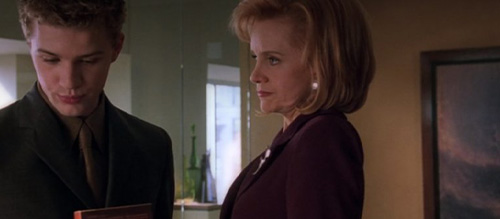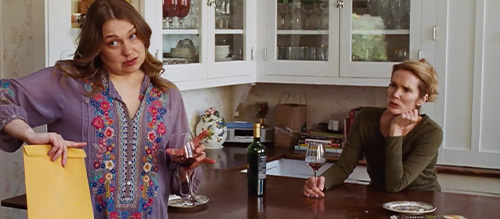Pagan Carruthers’ 5 More of the Best Character Introductions in Movie History
3. Sebastian Valmont
Cruel Intentions (1999)
“Every You, Every Me” by Placebo. New York City. A leather notebook. Ryan Philippe’s Sebastian drives his car down a highway past a cemetery during the foreshadowing opening credits of Roger Kumble’s Cruel Intentions.
The beginning of this film shocked me when I first watched it at age 16. It is even more unsettling now, in the post-#MeToo era.
“I can’t feel sorry for myself because I’m some poor little rich boy.” Sebastian laments in the expensive office of his therapist, who, just like everybody else, cannot help but to be charmed by him, though we sense her underlying annoyance at their time spent together.
“Autograph copy! Can I keep this?!” he says with youthful excitement when Dr. Greenbaum hands him a copy of her book “Great parenting! How To Raise the Perfect Child.”
Her face shows some suspicion when he tells her she has “killer legs” and that he’d love to photograph them, before he promptly declares he is cured. She reluctantly hugs him before her phone rings. We see a photo of her daughter and it’s none other than early 2000s icon Tara Reid. Sebastian strokes the photo of her daughter and states that this is the type of girl he’d like to be dating before his therapist informs him she’s out of his league.
After he has left the office, she answers the phone and it’s Reid in tears. Someone has taken nude photographs of her and uploaded them to the internet, photoshopping her body onto the cover of Dr. Greenbaum’s book. Her daughter recites Sebastian’s lines back to her as she describes the former lover.
We see Sebastian casually throwing away his book outside as Dr. Greenbaum begins screaming at him from her office, cementing him in our minds as an agent of chaos and master manipulator.
4. Jo March
Little Women (2019)
Jo March’s silhouette is framed by the door of Roberts Brothers publishing house in the opening shot of Greta Gerwig’s 2019 adaption of Louisa May Alcott’s “Little Women”. With her head bowed sombrely, she collects herself before her first meeting with her soon-to-be-publisher, Mr. Dashwood.
This is the seventh film adaption of the 1868 classic novel, so why does this introduction deserve to make the list?
Gerwig’s adaption does not open with a fifteen year old Jo going through adolescence in homely Concord, Massachusetts, but begins seven years later in New York City. The switching of the timeline throughout the film gives this version it’s own distinct voice and allows us to see the deep contrasts between youth and adulthood.
Jo enters the publishing office and looks around nervously as she makes her way to Mr Dashwood’s desk to try and sell a short story by “a friend of hers” to the paper. She attempts to hide the ink marks on her hands as she sits while the editor cuts out a large chunk of her story in front of her. She’s relieved when he laughs, winces when he cuts pages, but more than anything she’s eager.
Jo, who is famously based on Alcott herself and played by the stellar Saoirse Ronan, both begins and ends the film in Roberts Brothers. This frames Little Women with Jo’s relationship to her writing and commerce. We see how she navigates their discussion and has to make compromises (first over a short story, then over her own book) making Jo’s relationship to her art the centre of Gerwig’s adaption.
Recommended for you: Little Women (2019) Review
5. Cassie
Marriage Story (2019)
“Ok, I just get nervous!”
Much has been said about Laura Dern’s bold supporting performance as divorce-lawyer Nora in 2019’s Netflix original Marriage Story. She will likely win an Oscar for it. But thirty minutes into Noah Baumbach’s film we are introduced to a character so delightful I’d be happy if she had her own Netflix series.
Cassie, sister to Scarlett Johansson’s Nicole, has been given the task of serving Nicole’s husband Charlie with his divorce papers. Wine glass in-hand, she asks their mother why she has been given the awkward duty. Nicole reassures her sister that she will tell Charlie what is happening before Cassie physically hands him the papers. Naturally, nerves are abound.
What is so delightful about this performance from Merritt Wever (Unbelievable) is the stark contrast to the film thus far. It’s like Weaver has walked off the set of a 1950s screwball comedy and into Baumbach’s divorce drama. She immediately becomes the star of the scene, showcasing her comedic skill in and against the distressing plot line. This much needed tonal change from the deepening sadness of the end of a marriage is exactly what the audience needs.
Recommended for you: Other “5 of the Best Character Introductions in Movie History” Entries
Written by Pagan Carruthers
Make sure to support Pagan in the following places:
Twitter – @PaganCarruthers
Letterboxd – /pagancarruthers




